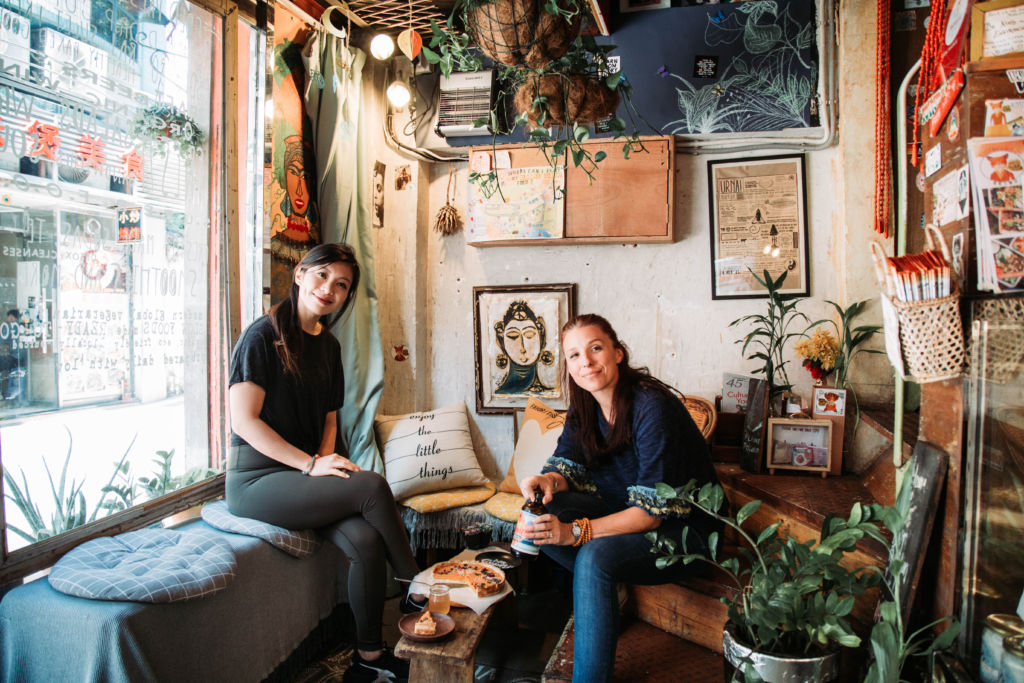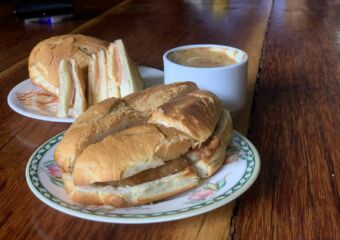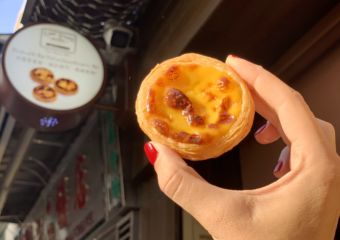As you stand outside The Blissful Carrot, nestled in the beautiful Taipa Village, you quickly realize that you’re somewhere very special. “Never doubt that a small group of thoughtful, committed citizens can change the world; indeed, it’s the only thing that ever has”, a quote by Margaret Meade, is painted on the wall outside the shop. We sat down with the two driving forces behind it, the lovely Alyson and Syen, and it is clear that they really took the motto to heart. The duo, along with their team of chefs and head baker, is working hard on several fronts to promote sustainability and eco-living, not only through The Blissful Carrot but also by a number of initiatives around conscious living and food education.
Tell us the story of The Blissful Carrot and how it came at the forefront of the vegetarian scene in Macau.
Alyson: The Blissful Carrot was started in 2014, very early in the year. Our partner Marissa who is still part of our trio lives in Mexico now, but she’s still semi-active in the business. This whole beautiful thing started with her having a lot of guts in this community to go out and pursue something that she’d been thinking about for a long time. Marissa and I have been friends for several years before that and we both got to Macau at the same time and thought about having a community garden or maybe even a food truck. Serendipitously, one day this space was available and a couple of days later, she had the keys! She used her two years’ worth of journals where she had been writing down recipes and traveling food inspiration in and created a monster menu full of a ton of global options for plant-based food. That’s the basics of how we started.
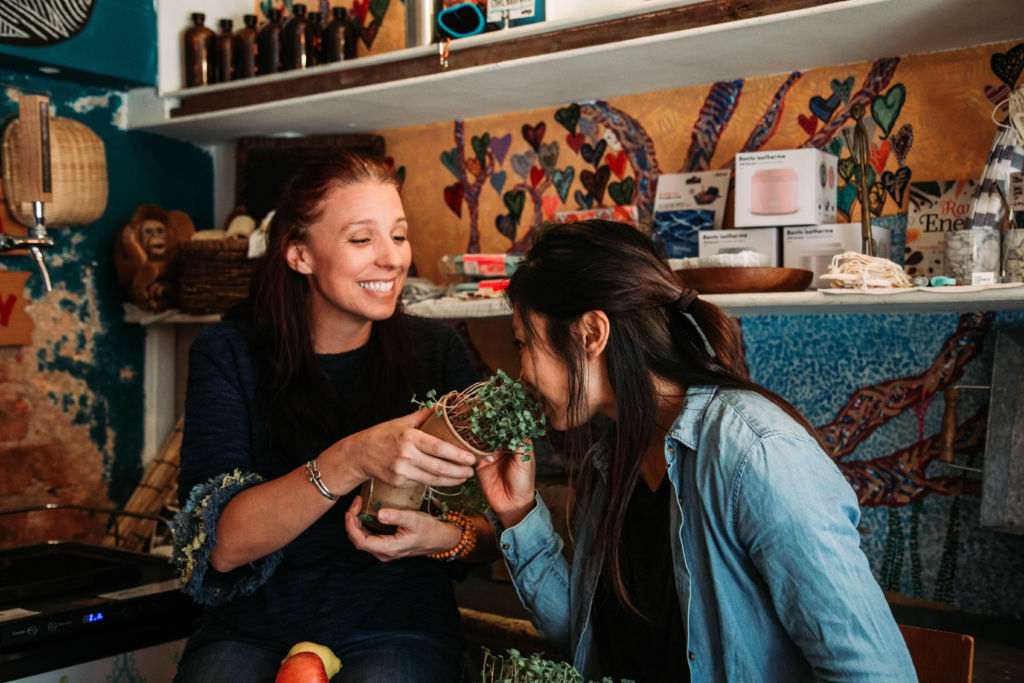
The Blissful Carrot, Alyson and Syen
Do you think the majority of people know enough about their food – where it came from and how it has been grown?
Syen: Not at all. I don’t think they know, especially in Asia. When you’re living in the city everything that you buy is from the supermarket or even some local markets. I guess while buying at the local market people get a little bit of the concept that if the fish is actually swimming and if it’s killed on the spot they think it’s fresh, but not necessarily. They don’t know in which farm it was in or what it has been fed, what sort of fish it is and things like that. When people seek healthy food, they just look at the label or brand name and if it is associated with something that’s healthy, they automatically think that it’s healthy.
Alyson: Food education is something that we’re working on as well to try to connect with the public, community, and schools. We sponsored an event with the IFT (Macao Institute for Tourism Studies) students. They put together a vegetarian CO2 (carbon dioxide) cutting dinner where they hosted one event to promote the vegetarian diet that helps cut down on CO2 in the city. So we’ve sponsored around a hundred meals for breakfast which they sold and donated the money made afterward. So this is one way to get to the students and really educate them on what is healthy food, what your breakfast can look like and that if it’s vegetarian it doesn’t have to be boring. It’s good food that’s good for your body as well.
Currently, there’s a growing interest in healthy eating, veganism, and vegetarianism. Does that mean we’re adopting a more conscious stance with regard to the world we live in?
Alyson: People may have found the movement through social media especially via Instagrammers. In fact, a European study that just came out showed that one of the top 10 global trends is conscious consumerism this year, for many different reasons. People support it because of animal welfare or personal health.
Beyond the trend is last year’s UN climate report which reported that we have 10 to 15 years to reduce global temperatures by 1.5 degrees Celcius. When people heard about that climate report, there was a worldwide agreement that the number one way you can be a participant and reduce this effect is to reduce your meat consumption. It’s not really realistic to ask everybody to become vegan or vegetarian overnight but to reduce and adopt moderation. Whether it’s meat-free Monday or cutting down one meal a day and trying to take the meat out, or just adjusting your portion sizes. We call that concept “cowding out” at The Blissful Carrot.
We’ve always been really proud of our hefty portions–sometimes you can break it up and make it into a couple of meals! Essentially, you’re going to be full of plants and you won’t have the inclination to pick up meat as an afterthought.
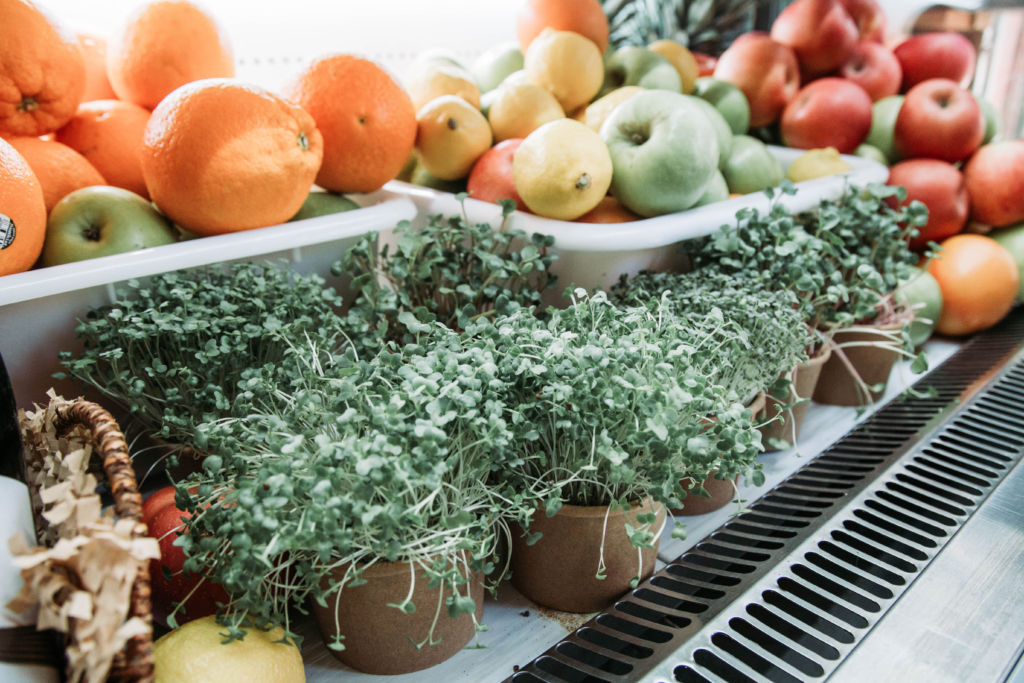
The Blissful Carrot, Microgreens and Fruits
How difficult is it to get organic produce to reach your shop? How does the supply chain work?
Alyson: Really difficult because The Blissful Carrot was one of the first restaurants in Macau to team up with an organic farm and we had a really great relationship with them for several years. However, the farm had to close because of unsustainable business practices, which is a total shame. It was a huge contributor to the community at the time and not an easy program to run. It really paid off in community dividends, but extremely work-intensive to get done. The supply chain is incredibly difficult: to keep the cold chain, establish the products being imported and making it easy to get to the shop.
Syen: We’re going to collaborate with a farm from Hong Kong which has farmland that is rented to produce organic vegetables. They already have some organic markets locally as well. We’re friends with one of them and he has a license to import from India and other countries because Hong Kong alone wouldn’t be able to provide enough for the demand–it wouldn’t be stable.
Alyson: Of course closer is always better, but unfortunately for us, there are no options that are super close. We want to reduce our carbon footprint as much as possible.
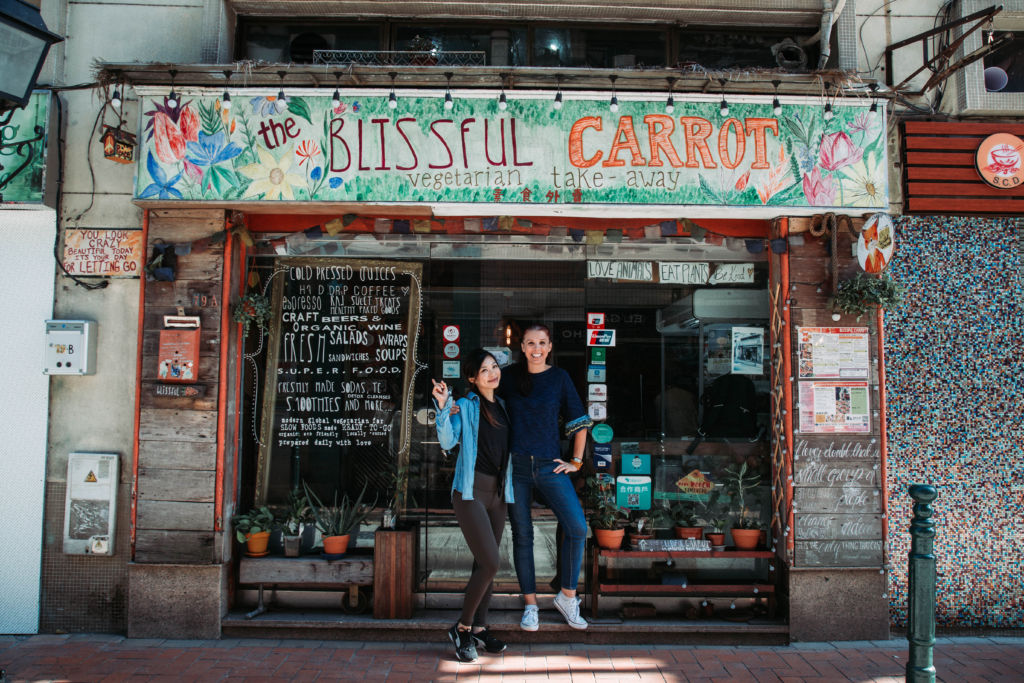
The Blissful Carrot
What are the biggest sustainability happenings in Macau? What can Macau residents do to support?
Alyson: There’s a bi-monthly cleanup being done by Macau ECOnscious which is a group of invested local people who are doing beach clean-ups mostly in Coloane. They are an awesome group to join!
Macau for Waste Reduction pops up in different areas in Macau and recycle items that are difficult to recycle, like different types of plastic, glass, styrofoam sleeves used for fruits and even phone covers. They’ll properly dispose of or upcycle them.
The third thing is we support are the zero-waste stores that are popping up in Macau. One of them is Concept H, owned by Calista. Calista has been pivotal in the zero waste movement as well. She stocks plenty of organic dried goods, fresh weekly organic produce and eco-friendly eatware and kitchen needs. Another one is Stuffbox Natural Friendly Store 自然友善店 owned by a young entrepreneur, Sonic, and he stocks all the things that you see on our shelves at his store–toothbrushes, soaps made in Macau, different kinds of eco-ware that you can dine with, lunchboxes, all sorts of things–his shop is amazing! He also has an online shop. We are rotating out his stock at The Blissful Carrot and will have new products coming very soon. We’re also carrying out a couple of other initiatives like BYOB. The easiest thing people can do to adapt, reduce waste and be environmentally friendly is to be resourceful and bring your own container, takeaway mug or bag.
The last thing that I think people can really do to help support this movement is to have your kids participate. Involve them as much as possible and have them pick up these habits as soon as possible. People need to demand that businesses do better and for businesses who are trying, support them with your dollars, encourage and shout them out on social media, and other ways that allow them to stay sustainable and keep going.
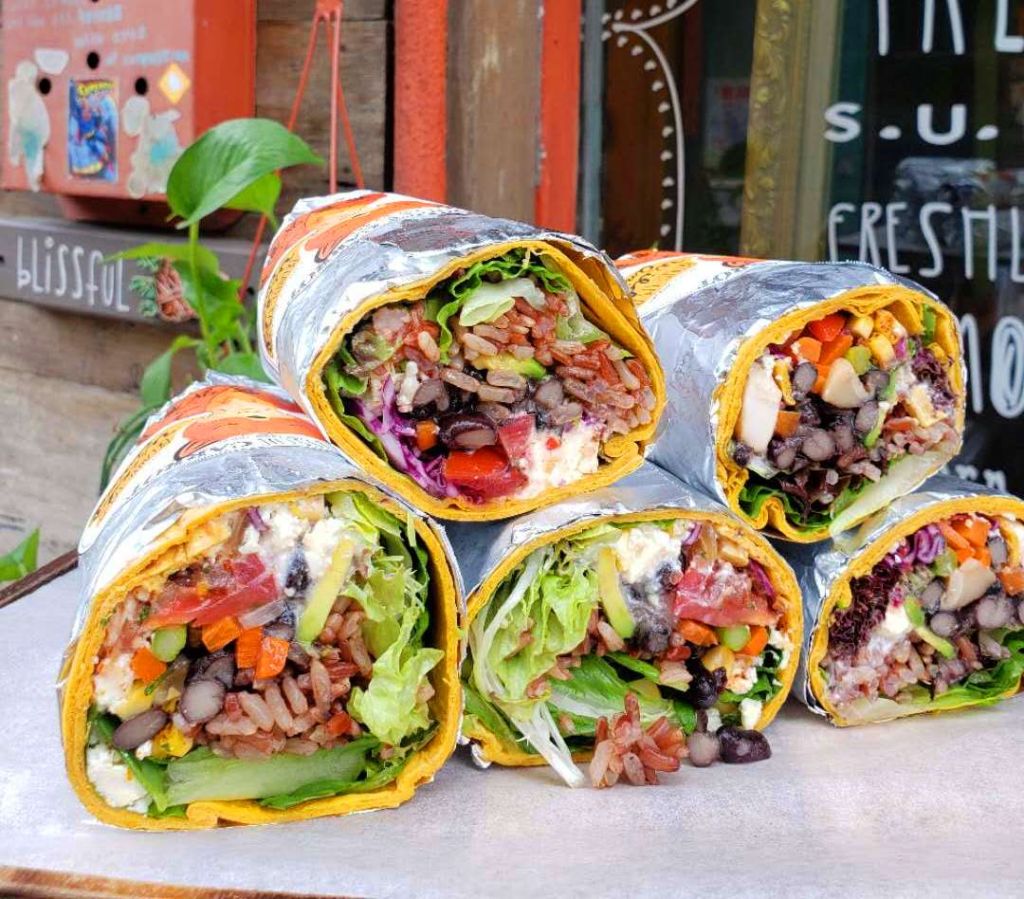
The Blissful Carrot, Burritos
Your menu is highly innovative with seasonal or special dishes. What is the process of researching new dishes and deciding what goes on the menu? Where does the inspiration come from?
Syen: It really comes from our day to day and what sort of ingredients are in season. We’re also inspired by the international audience as well. For example, we have Thai panang curry, this month as well, which was inspired by my trip. I tried it, had a chat with the people here and thought “We can do this!” For example, the Macanese dish minchi, a dish that we see everywhere, a traditional Macanese comfort food, we’ve tried to make a vegetarian version and trying a vegan way too.
Alyson: I think the major thing in bridging the gap for plant-based eating is to make it familiar to people. Our goal is to not try to make it inaccessible and only for very exclusive people with dietary requirements. We’re trying to include everybody and to show that adopting at least one plant-based meal a day is really easy. Thus, we use familiar foods on our menus, like tacos and burritos and Italian dishes and sandwiches to show people that they won’t miss meat which is one of the most important things. Additionally, we’ve expanded our reach through Aomi and Food4You, which are both great apps for people to get food more conveniently.
Using and eating seasonal ingredients is also a really great way to reduce your environmental impact. Nowadays we are forcing farms to farm out of season so they often have to use pesticides, waxes, and preservatives. So eating seasonally has been scientifically proven that these foods are more nutrient-dense. We’re actually not even getting the full benefit of foods if we don’t eat them in season.
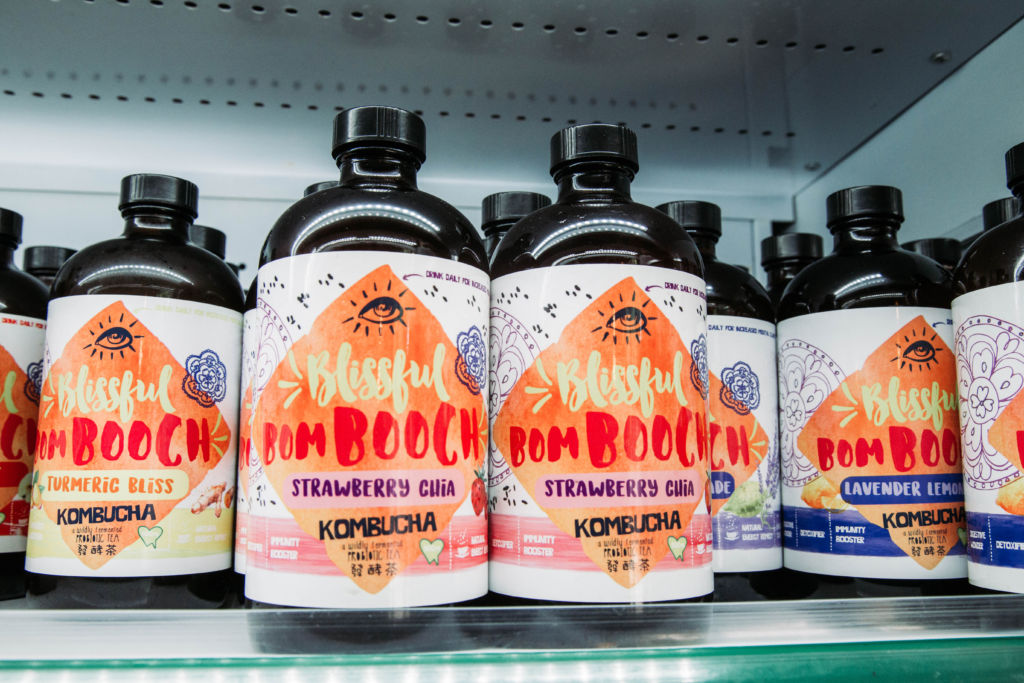
The Blissful Carrot, Bombooch Kombucha
Tell us about in-house made products and the star of made-in-Macau brands, Blissful Bombooch Kombucha.
Alyson: This shop was founded on making everything from scratch which we mostly still do and that’s everything from spice blends to dressings, sauces–everything. The kitchen is a really lively food laboratory and things don’t come out of packages or jars. Our team really does everything very hands-on and this is from the handmade pickles to fermenting everything from coconut yogurt to sauerkraut.
Adding fermented, probiotic filled food to every plate is really important for digestion and general health that adds to your gut health. Kombucha is a really easy way of pairing it with any dish and also getting a good boost of healthy microbes in your gut. I would say that I came upon fermenting in Macau because eating fermented food is a natural way to combat urban living. We’re all dealing with pollution, especially stress and high workloads. Taking public transport could also impact our immune system. So if you can be proactive and include fermented foods in your diet every day, you’re actually setting your immune system up to be really successful in this kind of environment.
What can we expect to see happening in the near future at The Blissful Carrot?
Alyson: We’ll have our annual ThanksLiving, which will be a seasonal event this year! It’ll run through December with a portion of proceeds benefiting local charities. We will feature a completely in house-made traditional vegan Thanksgiving meal with garlic mashed potato, spinach mushroom bread pudding, herbed roasted mixed veggies, cranberry orange chutney, shredded jackfruit carnitas and vegan pumpkin pie! We will also take part in the Climate Summit at TIS (The International School of Macao), speaking about sustainable food systems and doing a planting workshop.
Syen: We also have workshops that we’re planning to host to get the local community involved and interact with them about food so that they can learn more about where their food comes from, what is “ugly food” and why we shouldn’t avoid it. We talked to a local karate house with a good space in Macau. The fitness industry is willing to support and sponsor us with the venue and allow us to use the white wall and maybe do a movie night to project a conscious themed movie but this is still a plan in the works
For more information on The Blissful Carrot, check their www.facebook.com/blissfulcarrot
The Blissful Carrot* 79 Rua Direita Carlos Eugénio, Taipa Village, +853 6298 8433, www.facebook.com/blissfulcarrot
*The Blissful Carrot is no longer operating as a shop. However, they still sell vegetarian and vegan dishes, as well as their in-house-made pantry items such as coconut yogurt and kombucha via Aomi and MFood. If you have any questions, hit them up on Facebook and WhatsApp, but orders are to be placed via the delivery applications. For their Juice Detox program and private catering, contact The Blissful Carrot on Facebook or WhatsApp.

